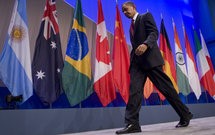 The foreign policy community’s anxious wait to hear US President Barack Obama make his foreign policy speech at the West Point Military Academy finally came to an end on 28 May, 2014. In his commencement address to the graduating military officers, President Obama outlined his foreign policy views and approaches that stunned some analysts, and pleased many ruling elites abroad.
The foreign policy community’s anxious wait to hear US President Barack Obama make his foreign policy speech at the West Point Military Academy finally came to an end on 28 May, 2014. In his commencement address to the graduating military officers, President Obama outlined his foreign policy views and approaches that stunned some analysts, and pleased many ruling elites abroad.
Some saw a new foreign policy approach in the US president’s speech, but those who keenly follow US foreign policy, saw very little in the content that could be described as new.
What was striking in the presidential address was Obama’s strong articulation of liberal institutionalism at a time when the potential military and economic rivals of the US are busy flexing their muscles in parts of Europe and Asia.
Highlighting the importance of observing international norms and rules, President Obama said, “American influence is always stronger when we lead by example. We cannot exempt ourselves from the rules that apply to everyone else.... What makes us exceptional is not our ability to flout international norms and the rule of law; it’s our willingness to affirm them through our actions.”
The decision to affirm the importance of international law, norms and institutions by a US president in the backdrop of one military intervention every 17 months between 1991 and 2001 is certainly a refreshing development to believers in multilateralism. Obama chided “a lot of sceptics who downplay the effectiveness of multilateral action,” and said, “working through international institutions, like the U.N. or respecting international law” was not a sign of “weakness.”
While many would contest his own approach to the UN in executing his war against terror in Afghanistan by use of Drones, championing liberal institutionalism at a time of planned withdrawal of troops from Afghanistan is understandable.
President Obama, moreover, has shown utmost restraint in dealing with difficult situations, such as the ones in Syrian civil war, Russia’s annexation of Crimea and the Chinese occupations of islands and atolls in South China Sea. His difficulty in handling violence and lawlessness in Iraq post the US withdrawal; in Egypt after the Arab Spring; and in Libya after the overthrow of Col. Muammar Gaddafi’s regime gives ample reason to sing the praise of liberal approach to international politics as opposed to the neoconservative penchant for frequent use of military and coercive diplomacy in dealing with international crises.
Obama coded his policy of using soft power instead of military means in this address by saying, “...U.S. military action cannot be the only, or even primary, component of our leadership in every instance. Just because we have the best hammer does not mean that every problem is a nail.”
Advocates multilateralism would certainly draw inspiration from Obama’s liberal approach to world affairs, but it is important note the traditional US foreign policy approach, cutting across the political divide that wasn’t missing in Obama’s speech. He made it loud and clear: “Let me repeat a principle.... The United States will use military force, unilaterally if necessary, when our core interests demand it.” And the US will obviously determine what that “core interests” would be. Does it mean his advocacy of liberalism is mere opportunism?
In any case, Obama has come under fire from many critics who say his foreign policy is just a “hedging strategy” and devoid of any “grand strategy.” Many Republicans and some Democrats have criticised his foreign policy as “global retrenchment” of the US that has shaken the confidence of allies and pleased the adversaries.
Some have lamented that he said little about meeting the emerging Russian challenge in Europe and the Chinese effort to dominate Asia. Newspaper editorials in the US carried no praise for Obama’s new foreign policy. Lawmakers in the US too remained unhappy. One Senator made a caustic remark on Obama’s speech: “The President’s speech was just another great example of his disastrous foreign policy. The reset and the pivots have all failed. All you have to do is look at Syria, Iran, Libya, Ukraine, or the South China Sea to see where this foreign policy gets us in the world.”
President Obama has approximately one and a half years before he leaves the White House. Many citizens of the US were expecting the president to spell out his foreign policy plans in coming months, but failed to get any satisfaction from the West Point speech. The rest of the world always carefully listens when an US president speaks.
The fact that there was hardly any adverse reaction to his speech from the rest of the world signals that Obama was actually speaking to his own people at West Point. One key new suggestion that needs more clarification is his proposal to set up $5billion worth structure to combat terrorism with willing partners around the world.
By Special Arrangement with Institute of Peace and Conflict Studies (http://www.ipcs.org)